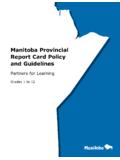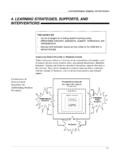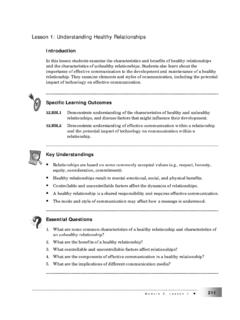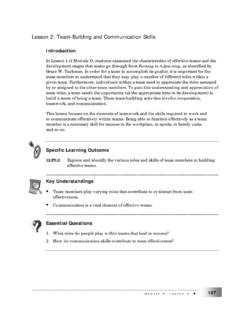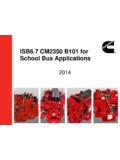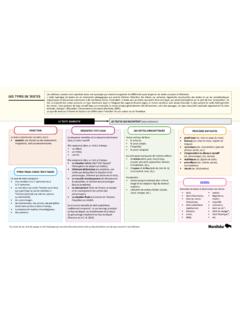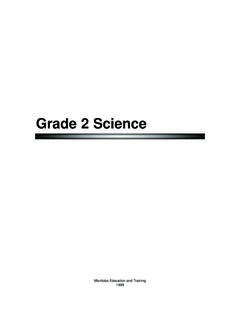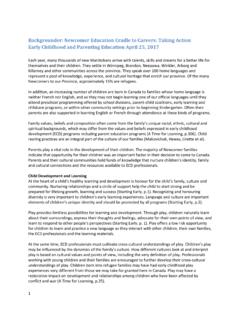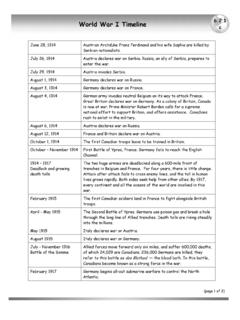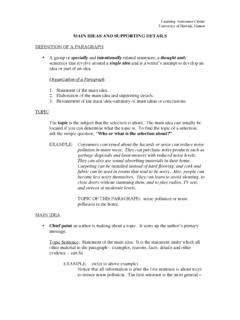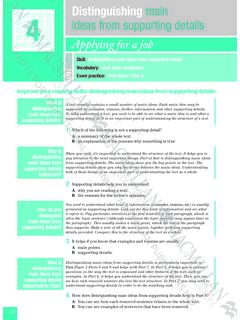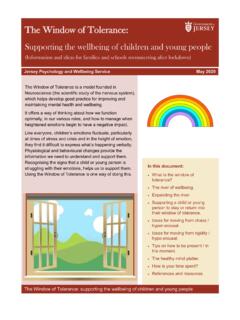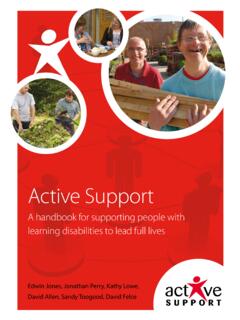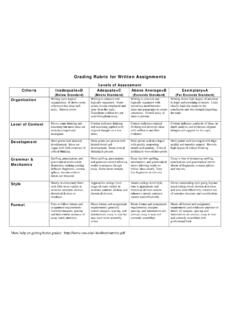Transcription of Supporting Students with Learning Disabilities Written in ...
1 4-1SU P P O R T I N G IN C L U S I V E SC H O O L SAD D R E S S I N G T H E NE E D S O F ST U D E N T S W I T H LE A R N I N G DI SA B I L I T I E SMO D U L E 4 : SU P P O R T I N G ST U D E N T S W I T H LE A R N I N G DI SA B I L I T I E S I N WR I T T E N EX P R E S S I O N4 ModuleSupporting Students with Learning Disabilities inWritten Expression4-2SU P P O R T I N G IN C L U S I V E SC H O O L SAD D R E S S I N G T H E NE E D S O F ST U D E N T S W I T H LE A R N I N G DI SA B I L I T I E SMO D U L E 4 : SU P P O R T I N G ST U D E N T S W I T H LE A R N I N G DI SA B I L I T I E S I N WR I T T E N EX P R E S S I O NThis module provides information about the characteristics of Students with a Learning disability in Written expression as well as programming approaches to support these Students .
2 Key ideas in this Module Students with a Learning disability in Written expression can have difficulties with all aspects of writing. Writing instruction is an integral and meaningful part of the curriculum in all subject/content areas. Educators should use a process-oriented approach to writing instruction. Students with writing Disabilities can benefit from the use of assistive technology to support their Learning . Instructional methods that include direct instruction, strategy instruction, and practice/ rehearsal are effective approaches to Supporting Students with identified writing Disabilities .
3 What Is a Learning Disability in Written Expression? A Learning disability in Written expression affects the ability to write and organize thoughts using appropriate detail, sequence, sentence structure, and literary form. In order to progress academically, Students must be able to effectively express their knowledge in writing. For Students with writing Disabilities , writing difficulties exist on two levels: (Schumaker & Deschler, 2003) 1. Transcription skills, which include handwriting, spelling, punctuation, and grammar 2. Composition/expressive writing skills, which include generating ideas , planning, organizing, and revising thoughts/ ideas to communicate meaning in a Written product (composition) In the Diagnostic and Statistical Manual of Mental Disorders, Fifth Edition (2013) (DSM-5), the diagnostic term Specific Learning Disorder with Impairment in Written Expression is used as outlined in Module 1, specifically for individuals who experience difficulty with spelling accuracy, grammar and punctuation accuracy, and/or clarity or organization of Written expression.
4 (p. 67, DSM-5) Students with a Learning disability in Written expression do not have a cognitive disability. Students with writing Disabilities have average to above average cognitive abilities. Their difficulties with writing are not caused by problems with vision, hearing, or fine motor control but these conditions can complicate their writing difficulties. 4-3SU P P O R T I N G IN C L U S I V E SC H O O L SAD D R E S S I N G T H E NE E D S O F ST U D E N T S W I T H LE A R N I N G DI SA B I L I T I E SMO D U L E 4 : SU P P O R T I N G ST U D E N T S W I T H LE A R N I N G DI SA B I L I T I E S I N WR I T T E N EX P R E S S I O NCharacteristics of Students with a Learning Disability in Written Expression During the school year, Students are expected to take notes, write assignments, and take tests; all of which require fluent and legible handwriting.
5 When transcription skills are not automatic, Students must direct their time and cognitive energy toward the basic writing skills involved with handwriting, spelling, and grammar instead of more complex skills such as planning, organizing, and revising. As a result, these Students may have difficulty with every stage of writing, from thinking of ideas through to revision and editing. Not only can Students perception of themselves be affected by the quality of their handwriting, other people sometimes make judgments about intelligence and capability based on poor handwriting.
6 By the time Students with writing Disabilities reach middle years and high school levels, their compositions are generally shorter, less organized, less varied in vocabulary, and of lower quality than their peers who do not have a Learning with a disability in Written expression may have difficulty in the following areas: Transcription Skills Mechanical aspects of writing: The handwriting of Students with a writing disability is often less legible than their peers and they tend to make considerably more spelling, grammar, and punctuation errors. Composition Generating content: Students with a writing disability are capable of generating the ideas orally.
7 Their difficulty may lie in the mechanics and organization skills needed to initiate and endure the task during the time allotted. They consequently often do not spend much time preparing to write. They do not recognize the value of the pre-writing phase and they do not know what to do with time allotted for pre-writing unless guided. Creating and organizing compositional structure: Students often begin writing what comes to mind or what they can easily remember. They do not adequately frame stories/compositions; they repeat simple sentences; and they use short, choppy sentences as well as run-on sentences.
8 Revising text and formulating goals: Students tend to focus on correcting punctuation, grammar, and spelling errors rather than organizing ideas , refining content, and completing the task. Whether a student has difficulties with transcription or expressive writing skills, the quality of writing will be affected. (Teaching Students with Reading Difficulties and Disabilities p. 46 /Beringer, Abbott, Whitaker, Sylvester & Nolan, 1995.) 4-4SU P P O R T I N G IN C L U S I V E SC H O O L SAD D R E S S I N G T H E NE E D S O F ST U D E N T S W I T H LE A R N I N G DI SA B I L I T I E SMO D U L E 4 : SU P P O R T I N G ST U D E N T S W I T H LE A R N I N G DI SA B I L I T I E S I N WR I T T E N EX P R E S S I O N Understanding the purpose of writing: Students often view writing assignments as question/answer tasks that require little preparation.
9 As such, if they feel the question has been answered, they may abruptly end their composition. Adapted from Steve Graham, ppt from CEC Convention 2010. Supporting the Student with a Learning Disability in the Area of Written Expression To become proficient writers, all Students must learn to synchronize multiple skills in transcription and composition. For Students with a Learning disability in Written expression, additional instructional interventions and adaptations to support Learning in both these areas are essential for them to be successful. The combined use of direct instruction, strategy instruction, practice, and rehearsal is the most effective way of addressing writing Disabilities .
10 For some Students with persistent difficulties with Written expression (transcription or composition) who may or may not have a formal diagnosis of a Learning disability, the collaborative process of student-specific planning may be necessary. Early intervention is important so that the student remains motivated and engaged in the Learning process. The student-specific planning team may recommend instructional strategies, adaptations, or appropriate assistive technology to assist the student in accessing the curriculum therefore allowing the student to show what they are capable of when the act of writing is supported appropriately.
